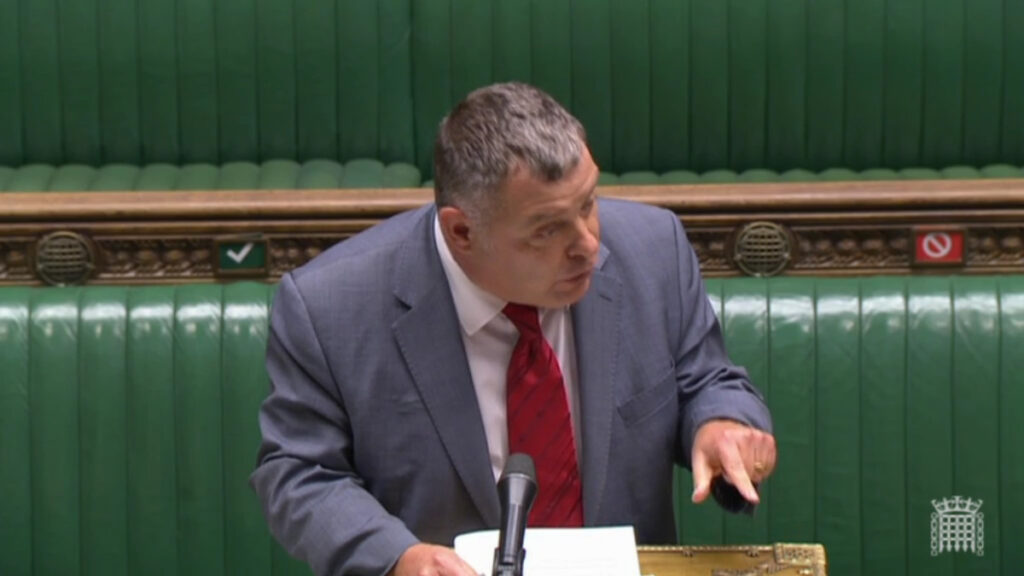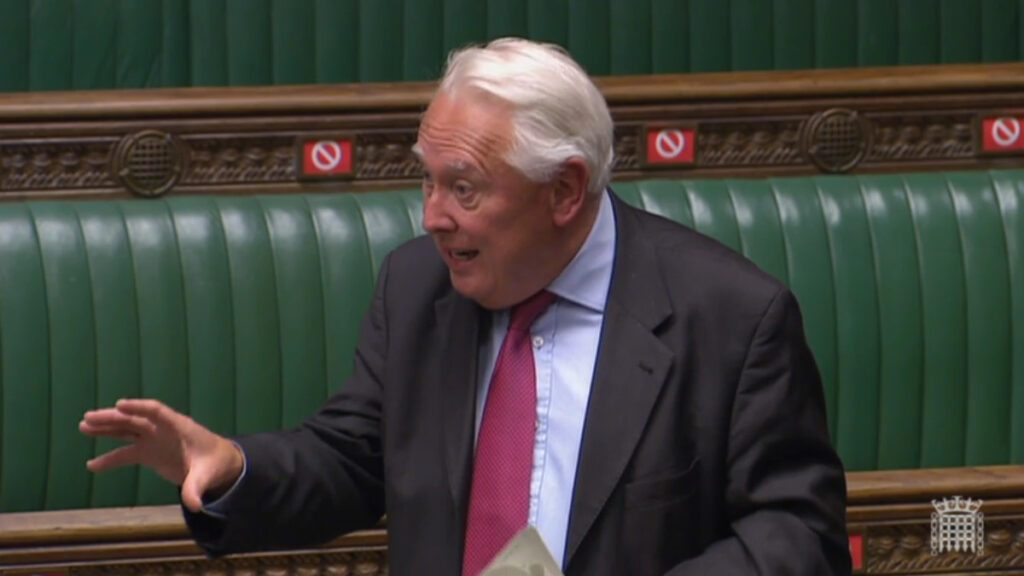
Community Secretary Robert Jenrick’s permitted development planning reform to allow freeholders to put two more storeys on to blocks of flats passed through the Commons yesterday.
Sir Peter Bottomley, one of the MP patrons of LKP who vehemently opposed the move, was the only Conservative MP to vote against the government. Others abstained, however.
He attacked “the property baron William Astor” of the £1.8 billion freehold fund Long Harbour / Adriatic Land and the Tchenguiz interest – for which Mr Astor worked – “which has done things that many would describe as crooked and others would describe additionally as improper”.
They have been “given a gift of tens of millions—potentially billions—of pounds, and who is paying? The leaseholders. Absolutely nobody else can.
The Father of the House added:
“All the benefits here go to the landlords and not the people who are living there and often in their first home …
“If I were on the Front Bench, my face would be red, and I would stand up at the end of this debate and say, “We apologise—we got it wrong.”
“The Town and Country Planning (Permitted Development and Miscellaneous Amendments) (England) (Coronavirus) Regulations 2020 is one of the worst things that has got through Government in my time here, which has been quite long.
“I say to the Government: revoke it. Even if they do not lose the vote today, they should put in a provision so that, if there is to be an application, a condition is that the freeholder landlord gives the freehold to the leaseholders, and they can decide whether to go for the application.”
LKP estimates that the give-away to residential freeholders, many of whom are anonymous offshore entities, is around £42 billion. Although only 800 new flats are likely to be built every year, according to the government, the statutory instrument torpedoes the Law Commission report to improve enfranchisement by leaseholders as the freeholds of most blocks of flats have been hugely enhanced in notional value.
Sir Peter ended his speech with an assortment of other leasehold concerns: “Have the Law Commission reports been enacted? Not yet, and they need to be. How about getting the property tribunal to work properly? How about getting the Leasehold Advisory Service to work in the interests of leaseholders?”
Parliamentlive.tv
Oral Questions to the Secretary of State for Northern Ireland Prime Minister’s Question Time Legislation: Non-Domestic Rating (Lists) (No.2) Bill: Second Reading Legislation: Sentencing Bill [Lords]: All Stages Oral Questions to the Secretary of State for Northern Ireland Q1.

Mike Amesbury, the Labour shadow minister for housing, caricatured Robert Jenrick as “Bob the bad builder” who, instead of having a “relentless focus” on victims of the cladding scandal, has undermined local democratic control over planning and gifted freehold owners of blocks of flats “a multi-million pound windfall of up to £42 billion”.
“No need for donors to attend the Carlton Club dinner circuit anymore and exchange chummy texts—just sneak the windfall through Parliament via an undebated instrument. What does that instrument deliver a year? Just 800 flats per year; that is 8,000 over a decade.”
Labour veteran Clive Betts, who chairs the Communities Select Committee, reminded the House that he had asked the Prime Minister “whether it was reasonable that flats of 16 square meters were allowed to be built, which was 1 square metre larger than the footprint of his car”.
Just before debate Mr Jenrick announced that all new homes delivered through the permitted development rights would be at least 37sqm (39sqm with a bathroom).
Other Conservative MPs criticised the planning give-away, with Robert Halfon (Harlow) saying of his town:
“Office blocks never intended for residential dwellings have been brought up on the cheap by developers and converted rapidly into rabbit-hutch housing.”
Theresa Villiers, representing Chipping Barnet in north London who abstained in the vote, backed Sir Peter Bottomley’s concerns. She raised fears about a new housing algorithm that “would more than double the housing target in my constituency and require the equivalent of a small new city somehow to be crammed into outer London. That would see the suburbs change forever.”

Sir Bob Neill, MP for Bromley and Chislehurst, declined to vote for the government and supported Sir Peter Bottomley in expressing repugnance towards the Tchenguiz interests.
“I also endorse what my hon. Friend Member for Worthing West (Sir Peter Bottomley) said about the serious failure—from my point of view, perhaps the most serious—of these SIs, which offer no protection for leaseholders in flats.
“Constituents of mine in Northpoint, which I have raised in the House on a number of occasions, suffer from having the freehold owned by an offshoot of the Tchenguiz property empire, whose behaviour towards those people has been disgraceful. The idea of enriching them is, I am afraid, simply not something that I can countenance. I cannot support a set of orders that do not yet give adequate protection to leaseholders.”
Matt Weston, Labour MP for Warwick and Leamington, said that the statutory instruments would allow developers to avoid their obligations to build social housing: only 6,300 new homes last year, while 17,000 were lost.
“We have had only 21 new social rented council homes built in Warwick district since 2010—and we wonder why we have a housing crisis.”
Apsana Begum, Labour MP for Poplar and Limehouse, raised the issue – as had Mr Amesbury – of Mr Jenrick attempting to push through the Westferry Printworks development for former publisher Richard Desmond.
Siobhain McDonagh, Labour MP for Mitcham and Morden, described the permitted development statutory instruments as “probably the worst and most shocking that I have ever seen over my 40 years working in housing and then as an MP”.
Kevin Hollinrake, the Conservative MP for Thirsk and Malton, applauded the reforms saying that he had seen “conversions of redundant office buildings that are not being used any more into perfectly adequate, nice apartment blocks for young first-time buyers”.
“Clearly there is a lot of merit behind permitted development, which has delivered 60,000 homes in the past few years in terms of additional stock. That is partly how this Government have doubled housing delivery since the lows of 2009. There is a lot to commend in the Government’s action on this.”
Ruth Cadbury, Labour MP for Brentford and Isleworth, also poured scorn on the government’s easing of planning constraints.
“I had 30 years of involvement in the town planning system before being elected to this place, and these instruments give me a terrible sense of déjà vu. In 2013, the Government introduced an extension of permitted development rights; then, as now, there was cross-party and cross-sector opposition. Why? Because extending PDR created, and will create, new slums of substandard housing, over which local planning authorities have little or no control and there is little or no opportunity for community input.”
Christopher Pincher, the housing minister who sat beside his boss Robert Jenrick during the debate, said his reforms would create 8,000 new homes a year, not 800 (a figure used solely in relation to the two-storeys on existing blocks of flats).
He acknowledged “bad developers are damaging the credibility of these rights, which are crucial for regenerating brownfield land across our country”.
But he added: “We will legislate so that all homes built through permitted development rights must meet space standards. They will be required to meet the nationally described space standards that the Government have already published, which will mean that permitted development rights can no longer be seen as a route to undercut housing standards.”
After the debate, in an echo of the Brexit wrangles last year, lawyers Leigh Day announced that it was seeking a judicial review of the statutory instruments and the high court will hear this between October 8 and October 15.





 Sector says ‘no, thanks’ to controversial Building Safety Bill
Sector says ‘no, thanks’ to controversial Building Safety Bill






















When the words of a highly respected and exerienced Politician who is also the ‘Father of the House’ seem to have no impact and the Minister being addressed looks like he has been put ‘over a barrel’ ie in a very difficult situation, then there must be something much more serious at stake than just the financial cost of remediation.
The whole question of freeholders/developers influence on Government policy has been laid bare and the fact that many of these ‘long term custodians of properties’ are unknown and from what information is available appear to live in foreign countries, in my opinion seems to indicate they are possibly persons with vested interests in how buisnesses are set up and funded in the UK with the consequences of what will happen if their cash flow ceases.
Why I ask do these freeholders need to be anonymous, why can’t the UK have a ruling which makes payment of rents to persons unknown illegal, we could then get an idea of what is going on and have them take some responsibility.
Mr Pincher made a statement that he wants more transparency in the leasehold system but it seems that does not include the fundamental question of the identities of freeholders.
Mr Bottomley also mentioned there were other concerns which have not been sorted out as yet, and as to why it is taking so long…? all we get are glib ministerial statements.
Lets weigh up the facts… the Cladding scandal, the Fleecehold scandal, the in house Trade Retail Estate Management self regulation farce along with Tribunals that have favoured the freeholders and a Gov.UK Leasehold service that from all accounts gives advice which has favoured and been infiltrated by the Freehold Management fraternity for some time past, and now I understand gives feeble advice, and lets not forget the unscrupulous and crooked landlords who have used unjust laws to make many peoples lives a misery, and now the gift of millions of pounds to freeholders at the expense of leaseholders.
It doesn’t take the Brain of Britain to see the common denominator in all this.
Just seen this from Transparency International UK..
” The Cost of Secrecy: The role played by companies registered in the UK’s overseas territories in money laundering and corruption
For decades, the Overseas Territories have represented a weakness in the UK’s approach to tackling the flow of corrupt wealth around the world. The corporate secrecy afforded by these jurisdictions has made them destinations of choice for corrupt individuals seeking to hide criminal acts and enjoy the proceeds of their crimes with impunity.
Using evidence from 237 corruption cases from the last 30 years, this briefing shows how 1,201 different companies registered in the UK’s Overseas Territories have aided gross abuses of entrusted power for private gain around the world.”
Well… could our system be giving these nameless scoundrels some more of our hard earned money via the identity-less freehold route.
Off topic, I have finally found an explanation for how selling houses leasehold in the North of England came to be the norm, and this explanation fits in with what I had supposed. Land owners – the aristocracy – wanted to keep title to THEIR land, simply the way to do this was to sell THEIR land to developers on a leasehold basis. The developers of course, having no title (to the developed land), sold the houses leasehold.
Need it be said that these leasehold house were not sold at a discount, the whole motivation for their sale on a leasehold basis was that the long standing land owning aristocracy could retain THEIR title to THEIR land.
As we all know in recent times the wide boys of the development and building industries exploited the existence of residential leasehold and came up with doubling ground rents etc..
What a filthy and corrupt and foul country we live in, what a craven and debased crowd we have in government, the civil service, and the judiciary. With the latter in mind, I think of Sir Terence Etherton (Master of the Rolls and Head of CIVIL JUSTICE) who saw no reason to abandon leasehold. Sir Terence had some minor tinkering in mind – I think, which would satisfy those he serves, but not anyone with half a mind among the serfs and peasantry.